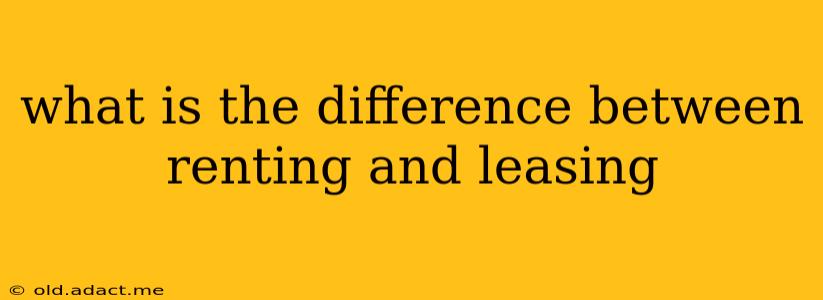What's the Difference Between Renting and Leasing? A Deep Dive into Tenancy Agreements
The terms "renting" and "leasing" are often used interchangeably, leading to confusion. While they both involve occupying a property in exchange for payment, there are key distinctions that impact your rights and responsibilities. Understanding these differences is crucial before signing any tenancy agreement.
What is Renting?
Renting typically refers to a shorter-term agreement, often month-to-month. It’s characterized by more flexibility for both the tenant and the landlord. The landlord might require less paperwork upfront, and the tenant can usually provide a shorter notice period to vacate. This arrangement often works best for those needing short-term accommodation or those uncertain about their long-term plans. The specific terms and conditions are largely dependent on the agreement negotiated between the tenant and the landlord.
What is Leasing?
Leasing, conversely, usually involves a longer-term agreement, often a year or more. It's more formal than renting, typically requiring a detailed lease agreement outlining the terms and conditions of the tenancy. This agreement usually covers aspects such as rent amount, payment schedule, lease duration, permitted uses of the property, responsibilities for repairs and maintenance, and penalties for early termination. Both parties are bound by the legally binding contract for the specified period.
What are the Key Differences Between Renting and Leasing?
While the lines can blur, here's a breakdown of the core differences:
1. Length of Agreement: This is the most significant difference. Renting tends to be short-term and month-to-month, while leasing is typically a longer-term commitment (e.g., one year or more).
2. Formalization: Leases are more formal, with a legally binding written contract outlining specific terms and conditions. Renting may involve a less formal agreement, sometimes even just a verbal understanding. However, it's always best to have any agreement, no matter how short the term, in writing to avoid future disputes.
3. Flexibility: Renting offers more flexibility. Both parties have more freedom to terminate the agreement with relatively short notice periods. Leasing is less flexible; breaking a lease often involves penalties as stipulated in the contract.
4. Security Deposit: Both renting and leasing usually involve a security deposit to cover potential damages. However, the amount and the conditions for its return might vary depending on the agreement.
5. Rent Control: Rent control laws and regulations often apply differently to leases and rental agreements. Longer-term leases might fall under specific protections not available to shorter-term rentals.
How do Rent-to-Own Agreements Fit In?
A rent-to-own agreement blends elements of both renting and leasing. It’s a longer-term agreement where a portion of the rent payment goes towards the eventual purchase of the property. It provides a pathway to homeownership but also carries significant risks if not carefully structured and understood. Seek professional legal and financial advice before entering into such an agreement.
What are the implications of choosing renting or leasing?
The best option depends on your individual needs and circumstances. Consider these factors:
- Financial stability: Can you comfortably commit to the longer-term financial obligation of a lease?
- Flexibility: Do you need the ability to move easily with short notice?
- Legal protection: Are you aware of your rights and responsibilities under each type of agreement?
Ultimately, carefully review the specific terms of any agreement before signing, regardless of whether it's called renting or leasing. Seek legal advice if needed to fully understand your rights and obligations. Choosing wisely will help you secure a comfortable and legally sound tenancy.
